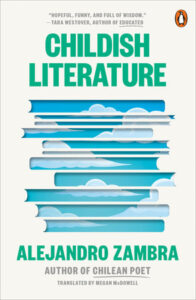
[Fitzcaraldo Editions; 2024]
Tr. from the Spanish by Megan McDowell
Parenthood is a hot topic, particularly the decision of whether or not to become one. The argument has tropes: the environment (will an additional child in the world result in a measurable increase in emissions?); society (are children a social good?); politics (is having a child desirable or feasible in a time of political uncertainty? Is there a political valence to procreation?). The debate over child-having has extended into America’s most recent presidential election, in which the degree of subsidy for children (or punishment for not having them) was a genuine, if eccentric, part of the policy debate. What gets conspicuously left behind in these debates, however, is the actual experience of child-having, which is a much harder-to-define thing than any of these abstract ideas.
Alejandro Zambra wrote this collection of essays, stories, and poems in part to remedy this lack of emotional specificity on the topic. The collection meanders from an early series of meditations on fatherhood, and proceeds to a collection of stories, many of which describe his own relationship with his father through the lens of his son’s relationship with the same man (his grandfather). The thematic linkages between the pieces feel tenuous at times, but the book succeeds at elucidating a real, lived experience of fatherhood. This is especially true of the fluid and immediate first piece, in which Zambra, a prominent contemporary Chilean poet, examines days in his own life during the first year of having a child. The collection is translated by Megan McDowell, a prolific interpreter of Zambra’s prose who has had a long partnership with the author—this is the seventh of his works she has translated over the course of their now thirteen-year working relationship.
The book opens with a fragmentary essay which combines a series of reflections on parenthood that Zambra has while holding his infant son. He comments that the pieces were originally poems, but only because it’s easier to press “enter” on a phone than to add punctuation. In these sketches, Zambra lays out the main concern which will animate the book—the odd absence of biological or cultural ceremony that might have accompanied his entrance into fatherhood:
Since all human beings—I assume—have been born, it would seem natural for us to be experts in matters of child-rearing, but it turns out that we know very little, especially men, who sometimes seem like those cheerful students who show up to class blissfully unaware that there’s a test. While women passed on to their daughters the asphyxiating imperative of maternity, we grew up pampered and ineffectual and even humming along to “Billie Jean.” Our fathers tried, in their own ways, to teach us to be men, but they never taught us to be fathers. And their fathers didn’t teach them either. And so on.
Zambra notes that when fatherhood is discussed in literature it is usually as an obstacle or inconvenience—that the baby is keeping the father from his work, his novel, his job, the insight that’s around the corner. Fatherhood is never located as a source of interiority and experience; it is usually mentioned offhand, as a detail or inconvenience. The experience of parenthood, and fatherhood particularly, is relegated in the same way that the experience of childhood often is, as something that is not quite meant for adults, not an appropriate area of artistic inquiry. What could be interesting, we think, about wiping grainy shit from a plump little butt, especially when we can take mushrooms, go to Bali, or get drunk on a rooftop in Manhattan?
I’m not trying to denigrate any of these activities. But there is a tension. The people that I know who have kids resent the implication that their lives are lesser, that they are more mired in tedium than our childless peers. My friends that do not have children want their lives apprehended as full of meaning, whether or not they chose to procreate.
I can disclose, at this point, that I’m on the parental side of this divide, having welcomed my son, Izzy, into the world eighty-two days ago (according to the calendaric style favored by Zambra). I had so many of the same thoughts entering into fatherhood that I sent sections to my wife as a kind of explanatory text as to how it feels to be a father.
So, how does it feel to be a father? It is a sensitive, self-reflective state. I am always aware of the political and social tenuousness of my position, the expectation that I will disappoint, the lack of a solid script. Zambra tells a story of a man who sees himself carrying his infant son home from the bakery, who asks where the child’s mother is. “Asshole, asshole,” is all Zambra can muster in terms of a comeback. But, at the same time, when he reaches home, he passes the child to its mother.
Literature has ceded to self-help nearly all the reflective space that fatherhood requires. But self-help books usually hold nothing but hackneyed and at times even humiliating advice. A few months ago, I read a voluminous manual whose brilliant recommendation for men was this: “Be sensitive!”
I am familiar with Zambra’s reaction to this sort of thing. I feel the same anger when people ask me, as I push Izzy in his stroller through the co-op or down the block, if I’m “babysitting” or doing “daycare.” There are political and social reasons why this is bad, of course, but more than anything else, I resent the idea that my relationship with my son is less meaningful than his relationship with his mother, that I have fewer responsibilities and, consequently, a weaker bond. At the same time, Izzy does prefer his mother—when he grabs at my nipples, there’s no nourishment there. For me, there’s a soft defensiveness and a soft desire to fatherhood, the defensiveness of doing something that does not come naturally, the desire to do it well enough to fill that hole, real or imagined, naturally ordained or socially constructed.
Perhaps all fathers are, in a way, stepfathers to our children. Biology assures us a place in their lives, but we still long to be chosen.
After detailing the first 365 days in his child’s life, the book metamorphoses into a series of narratives about children and fathers. Several of them center on the sweetly eccentric relationship between Zambra’s own father and his son, who have long, rambling phone calls each Sunday, and who seem to have a unique and special language between the two of them.
While it contains sweet moments, this pivot from reflection to reminiscence blunts the abstract but pointed thrust of the book. Zambra notes early on that sons write about (or to) their fathers far more than fathers write about their sons, and this pivot in the form and direction of the book creates the space for stories and reminiscences about Zambra’s own father. The stories are moving, balanced, and insightful, but lack the heft of the first sections.
Still, the stories trace the growth of Zambra’s relationship with his son, filling in the empty space around this relationship (newborns are unable to create compelling dialogue) that he creates in the first section. His son appears more and more—he loves a story about a mole with poop on his head, enjoys counting cars out the window, becomes obsessed with stealing his father’s glasses. Zambra first experiences and then inhabits his relationship with his son, from the bittersweet dream he has after eating a bit too much mushroom-laced chocolate, of his son at age eighty, to planning a fishing trip with his son and father. In the last paragraph of the book, his son addresses the condition that Zambra articulates early on, that all fathers long to be chosen by their children:
“When you get old, I’m going to buy you the best wheelchair so we can go on walks,” you told me when you had just turned four years old. I would rather tell you every one of these stories, expanded and improved, someday in your youth when you are bored enough to take me out for a walk in that splendid wheelchair you promised me. I like to think that this book is nothing but a script for those slow outings of the future.
Eamonn Gallagher is a writer and researcher living in Minnesota.
This post may contain affiliate links.






